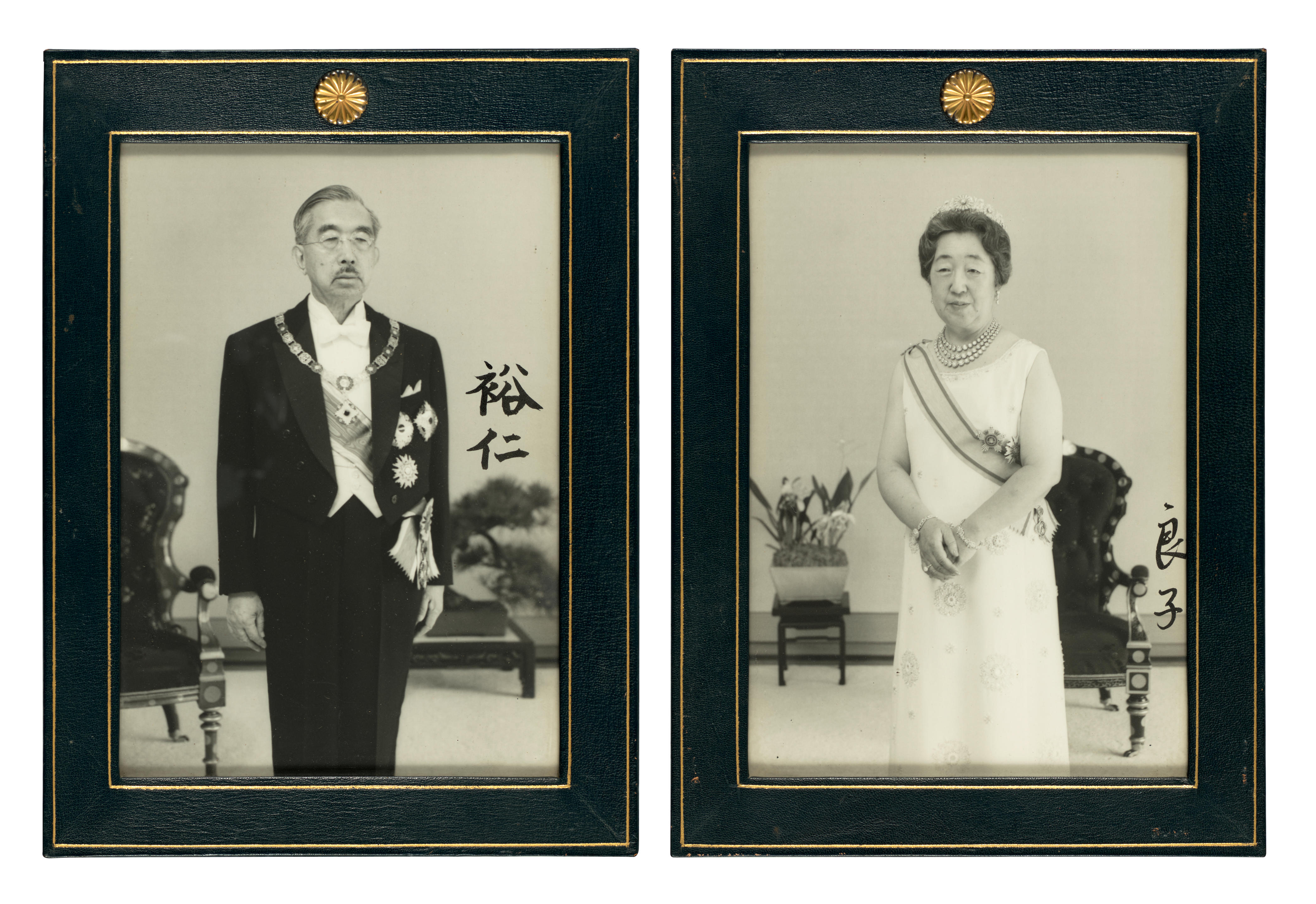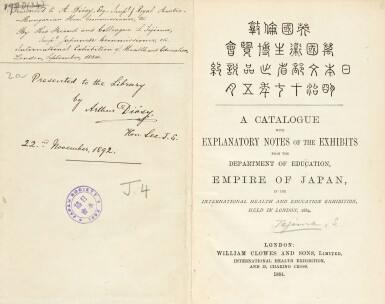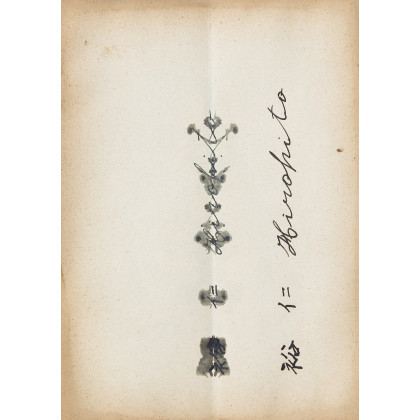Autograph Manuscript in Japanese, Showa Tenno Dokuhakuroku 昭和天皇独白録 "The Emperor's Monologue," transcribed by Terasaki Hidenari, 2 volumes, 173 leaves rectos only, 260 x 175 mm, [March - April 1946], written neatly in pencil (excepting page 1, and marginal notes throughout the two volumes, in black ink), each page numbered at upper left, volume 1, 3 preliminaries, pp 1-81, volume 2, pp 82-170, each page with printed ruled lines, and printed name Terasaki Yosen 寺崎用箋 (Terasaki letter paper) at lower left, the two volumes each bound with string in plain paper covers inscribed respectively Daikken, Dainiken 第一巻、第二巻 (Part 1, Part 2), some light creasing to a few margins. Provenance: Written by Terasaki Hidenari 寺崎英成 (1900-1951), recovered by his widow Gwen Terasaki (1908-1990) on a visit to Japan in 1958, thence by descent to her children. THE EMPEROR'S MONOLOGUE. EMPEROR HIROHITO GIVES HIS THOUGHTS, IN HIS OWN WORDS, ON MOMENTOUS EVENTS IN JAPANESE HISTORY FROM 1928 TO 1945. Between March 18 and April 8 1946, with the likely encouragement of Douglas MacArthur, the Supreme Commander for the Allied Powers, five Japanese court officials took down replies given by the Emperor Hirohito to questions posed to him over five sessions, lasting more than eight hours in total. One of the officials was Terasaki Hidenari (see also following two lots), a fluent English-speaking diplomat, married to an American, who on February 20 1946 had assumed the special post of "Liaison Officer to the Imperial Household," with responsibility for interpreting for the Emperor and advising him on his dealings with General Douglas MacArthur (Bix 1992, p 357). Terasaki wrote extensive notes of the Emperor's answers, in pencil on his own family letter paper; these notes, which comprise the present 2 volume notebooks, are the ONLY EXTANT FULL RECORD OF THE EMPEROR'S SPOKEN MEMOIRS, and constitute a key resource for the understanding of twentieth-century Japanese history. Part 1 of Terasaki's manuscript opens with the Emperor's brief remarks on the ultimate origins of World War II, which he traces to the Great Powers' rejection of the principle of equality between the races at the Versailles Peace Conference, the prohibition on Japanese immigration to California, and the forced return to China of Japan's Qingdao protectorate in Shandong Province. Based on the first session on March 18, 1946, the narrative begins with events from 1928, in particular the assassination of the Manchurian warlord Zhang Zuolin (1928) and the resignation, at the Emperor's instigation, of Prime Minister Tanaka Giichi (1929), an event which, the Emperor claims, made him decide that in future "I would approve Cabinet decisions even if I opposed them." There follow accounts of such momentous developments as the Manchuria (1931) and Shanghai (1932) Incidents, the outbreak of full-scale war with China (1937), the Nomonhan clashes with the Soviet Union (1939), and the Tripartite (Axis) Pact (1940). The Dokuhakuroku continues with the Emperor's remarks (second session, March 20) covering events up to the planning of the attack on Pearl Harbor and continues (third session, March 22, and subsequent sessions; Part 2 of Terasaki's manuscript) with the declaration of war on the United States, the ebb and flow of the war, the rise and fall of successive cabinets, the Potsdam Declaration of July 26, 1945, the final Imperial Conference on August 14, and Japan's eventual capitulation, concluding with the Emperor's statement that if he had vetoed the decision to go to war, it would have resulted in a civil conflict that would have been even worse and "Japan would have been destroyed." In the late 1980s Terasaki's widow Mariko (Mako) entrusted the Dokuhakuroku manuscript temporarily to Tokyo's Bungei Shunju magazine which printed its contents in December 1990 along with Terasaki's Diaries (lot 1262), going on to issue both documents in book form in March 1991; this publication was an instant sensation and so
Autograph Manuscript in Japanese, Showa Tenno Dokuhakuroku 昭和天皇独白録 "The Emperor's Monologue," transcribed by Terasaki Hidenari, 2 volumes, 173 leaves rectos only, 260 x 175 mm, [March - April 1946], written neatly in pencil (excepting page 1, and marginal notes throughout the two volumes, in black ink), each page numbered at upper left, volume 1, 3 preliminaries, pp 1-81, volume 2, pp 82-170, each page with printed ruled lines, and printed name Terasaki Yosen 寺崎用箋 (Terasaki letter paper) at lower left, the two volumes each bound with string in plain paper covers inscribed respectively Daikken, Dainiken 第一巻、第二巻 (Part 1, Part 2), some light creasing to a few margins. Provenance: Written by Terasaki Hidenari 寺崎英成 (1900-1951), recovered by his widow Gwen Terasaki (1908-1990) on a visit to Japan in 1958, thence by descent to her children. THE EMPEROR'S MONOLOGUE. EMPEROR HIROHITO GIVES HIS THOUGHTS, IN HIS OWN WORDS, ON MOMENTOUS EVENTS IN JAPANESE HISTORY FROM 1928 TO 1945. Between March 18 and April 8 1946, with the likely encouragement of Douglas MacArthur, the Supreme Commander for the Allied Powers, five Japanese court officials took down replies given by the Emperor Hirohito to questions posed to him over five sessions, lasting more than eight hours in total. One of the officials was Terasaki Hidenari (see also following two lots), a fluent English-speaking diplomat, married to an American, who on February 20 1946 had assumed the special post of "Liaison Officer to the Imperial Household," with responsibility for interpreting for the Emperor and advising him on his dealings with General Douglas MacArthur (Bix 1992, p 357). Terasaki wrote extensive notes of the Emperor's answers, in pencil on his own family letter paper; these notes, which comprise the present 2 volume notebooks, are the ONLY EXTANT FULL RECORD OF THE EMPEROR'S SPOKEN MEMOIRS, and constitute a key resource for the understanding of twentieth-century Japanese history. Part 1 of Terasaki's manuscript opens with the Emperor's brief remarks on the ultimate origins of World War II, which he traces to the Great Powers' rejection of the principle of equality between the races at the Versailles Peace Conference, the prohibition on Japanese immigration to California, and the forced return to China of Japan's Qingdao protectorate in Shandong Province. Based on the first session on March 18, 1946, the narrative begins with events from 1928, in particular the assassination of the Manchurian warlord Zhang Zuolin (1928) and the resignation, at the Emperor's instigation, of Prime Minister Tanaka Giichi (1929), an event which, the Emperor claims, made him decide that in future "I would approve Cabinet decisions even if I opposed them." There follow accounts of such momentous developments as the Manchuria (1931) and Shanghai (1932) Incidents, the outbreak of full-scale war with China (1937), the Nomonhan clashes with the Soviet Union (1939), and the Tripartite (Axis) Pact (1940). The Dokuhakuroku continues with the Emperor's remarks (second session, March 20) covering events up to the planning of the attack on Pearl Harbor and continues (third session, March 22, and subsequent sessions; Part 2 of Terasaki's manuscript) with the declaration of war on the United States, the ebb and flow of the war, the rise and fall of successive cabinets, the Potsdam Declaration of July 26, 1945, the final Imperial Conference on August 14, and Japan's eventual capitulation, concluding with the Emperor's statement that if he had vetoed the decision to go to war, it would have resulted in a civil conflict that would have been even worse and "Japan would have been destroyed." In the late 1980s Terasaki's widow Mariko (Mako) entrusted the Dokuhakuroku manuscript temporarily to Tokyo's Bungei Shunju magazine which printed its contents in December 1990 along with Terasaki's Diaries (lot 1262), going on to issue both documents in book form in March 1991; this publication was an instant sensation and so










.jpg)

.jpg)
Testen Sie LotSearch und seine Premium-Features 7 Tage - ohne Kosten!
Lassen Sie sich automatisch über neue Objekte in kommenden Auktionen benachrichtigen.
Suchauftrag anlegen